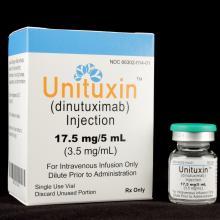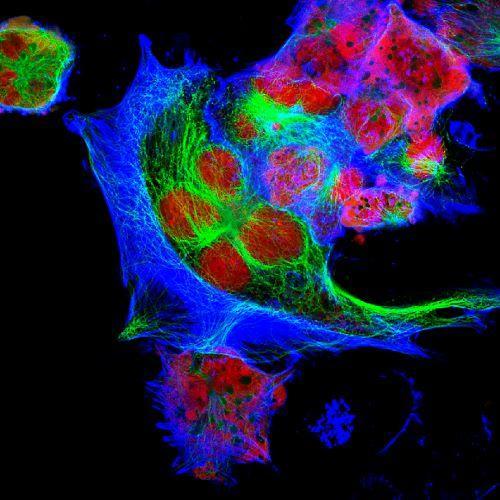Latest Results
Study Confirms Dinutuximab Extends Life for Children with High-Risk Neuroblastoma
“In a clinical trial of nearly 1,200 children with high-risk neuroblastoma, researchers have confirmed that the immunotherapy drug dinutuximab (Unituxin) can help children live longer.
Five years after being treated with dinutuximab, given along with two immune-boosting compounds and isotretinoin, 72% of children in the study were still alive and 61% had no evidence that their cancer had come back or their tumors had grown.
The study results were published July 15 in the Journal of Clinical Oncology.
The findings come from an extension of a clinical trial that initially compared isotretinoin alone with isotretinoin in combination with dinutuximab and the two immune-boosting compounds.”
Credit: Cancer Currents, July 2022
Pathway to Discovery
In the late 1980s, Alice Yu, M.D., at the University of California, San Diego Medical Center, began testing an approach that used laboratory made antibodies, called monoclonal antibodies, as a treatment for neuroblastoma. Monoclonal antibodies are designed to target a specific protein or cell. Dr. Yu's immunotherapy treatment went through many versions before reaching its current standard, a monoclonal antibody ch14.18—a chimeric monoclonal antibody composed of a combination of mouse and human DNA.
In 2001, Dr. Yu and colleagues in the Children's Oncology Group, part of NCI’s National Clinical Trials Network, tested the ch14.18 monoclonal antibody on 226 neuroblastoma patients. The treatment was given to children who already had responded to initial treatment with chemotherapy, radiation, and stem cell transplantation. The ch14.18 antibody was administered along with two immune-stimulating agents, GM-CSF (granulocyte macrophage colony stimulating factor) and IL-2 (interleukin-2), to increase the effectiveness of immune system killing of the tumor cells.
NCI’s Contribution
Several groups within NCI were involved in this discovery to commercialization story.
In 2001 the Children’s Oncology Group, part of NCI’s National Clinical Trials Network, collaborated with Dr. Yu to conduct tests of ch14.18 on 226 patients with neuroblastoma.
Next, NCI’s Biopharmaceutical Development Program (BDP) at the Frederick National Laboratory for Cancer Research produced ch14.18, for the NCI-sponsored clinical trials that proved the drug’s effectiveness against the disease. When no pharmaceutical company was willing to manufacture the anti-GD2 (ch14.18) antibody for the clinical trial, NCI began producing the antibody itself. Once its effectiveness was proven, NCI increased production of the antibody to ensure availability for every child with neuroblastoma who is eligible for the treatment.
Industry Partner’s Contribution - United Therapeutics Corporation
In 2010, NCI entered into a Cooperative Research and Development Agreement (CRADA) with Maryland-based United Therapeutics Corp., under which the company assumed responsibility for manufacturing dinutuximab and moving it through the steps required for regulatory approval.
As part of the dinutuximab approval, UTC will conduct additional studies to gather more information about the product's safety, efficacy, and optimal use.
UTC took the product to licensure to manufacture and market dinutuximab (ch14.18) under the brand name Unituxin.
UTC also collaborated with the NCI - the Children’s Oncology Group and the BDP—in the clinical trials that led to FDA approval.
The Role of Technology Transfer
TTC's role included:
- Leading a focused marketing campaign to identify a partner capable of continuing the manufacture of Ch14.18 and performing the clinical studies necessary for filing an New Drug Application (NDA).
- Writing the advertisement of a CRADA opportunity
- Providing extensive technology transfer guidance and agreement support in NCI's selection of a collaborator.
- Negotiating and managing a CRADA and several related technology transfer agreements that.
- took into account the transfer of the NCI BDP’s evolving drug production process
- supported the transfer of data from the Division of Cancer Treatment and Diagnosis (DCTD)-sponsored clinical trials of Ch14.18. This data transfer was instrumental in attaining FDA approval of Ch14.18 as a treatment in children with high-risk neuroblastoma.
The Result
On March 10, 2015, the U.S. Food and Drug Administration approved Unituxin™ (dinutuximab or monoclonal antibody ch14.18) as part of first-line therapy for pediatric patients with high-risk neuroblastoma, a rare cancer that most often occurs in young children. In August 2015, the European Commission granted authorization for the marketing of Unituxin™ for treatment of pediatric neuroblastoma. NCI was able to help realize the commercialization a new therapy for an orphan disease and the prospect for the development of other new therapies for prevention and treatment of rare pediatric cancers due in part to the FDA’s issuance of a rare pediatric disease priority review voucher to UTC.
“Children with neuroblastoma will benefit from this collaboration,” said Malcolm Smith, M.D., Ph.D., associate branch chief of pediatrics in NCI’s Cancer Therapy Evaluation Program. “And importantly, it provides a pathway for future development of agents for childhood cancers, even when there is no pharmaceutical company initially interested in them because there is no adult indication.”
Awards
2016 Federal Laboratory Consortium 'Excellence in Technology Transfer' award for "Discovery to Commercialization: New Immunotherapy for Rare Childhood Cancer, Neuroblastoma" — April 2016
2015 Federal Laboratory Consortium of the Mid-Atlantic Region (FLC-MAR) ‘Excellence in Technology Transfer’ award for “First FDA Approval: Combination Therapy for Rare Cancer, Neuroblastoma” — November 2015
The FLC Excellence in Technology Transfer award “recognizes employees of FLC member laboratories and non-laboratory staff who have accomplished outstanding work in the process of transferring federally developed technology.” For NCI TTC, these awards exemplify the culmination of the sustained work being performed by our team every day to facilitate collaborations and realize new cancer discoveries.

